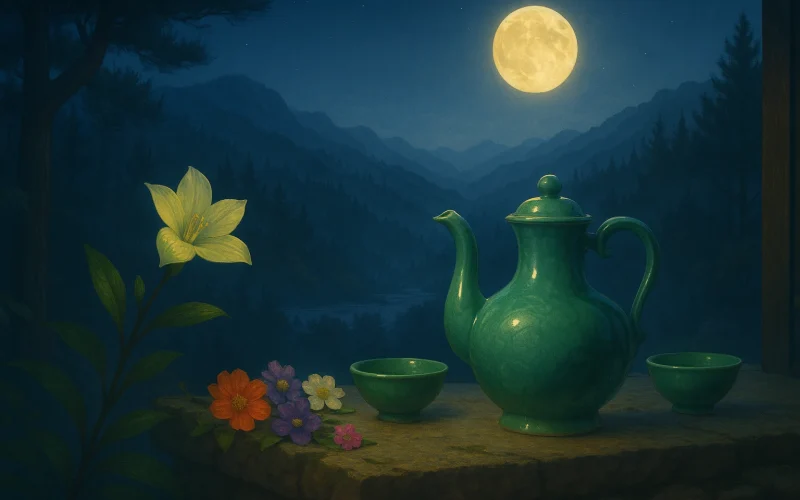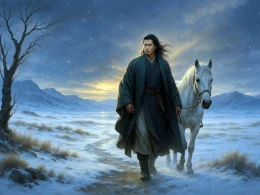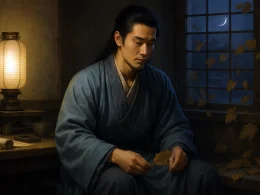The cold rain but adds to summer's humid air,
The mist, newborn, can't clothe spring's presence fair.
A few small twigs with blossoms barely awake,
Deeply grieve the flower-guardian in their sake.
Original Poem
「早春」
陆龟蒙
雨冷唯添暑,烟初不著春。
数枝花颣小,愁杀扈芳人。
Interpretation
This short spring poem was written in the late Tang Dynasty, an era marked by social instability and political darkness. Poets often sought solace in landscapes and pastoral themes, expressing emotions through subtle depictions of nature. Lu Guimeng, who experienced lifelong career disappointments, frequently roamed the rivers and lakes of Jiangnan, channeling his feelings into poetry inspired by natural scenes. This work captures the climate and scenery of early spring—hinting at vitality yet still gripped by cold—reflecting the poet’s inner melancholy.
First Couplet: "雨冷唯添暑,烟初不著春。"
Yǔ lěng wéi tiān shǔ, yān chū bù zhe chūn.
The cold rain only adds dampness, not warmth;
The faint mist does not yet cling to spring.
The opening lines directly depict early spring’s climate: warmth is tentative, cold rain still chills, and spring’s presence is faint. "Only adds" (唯添 wéi tiān) emphasizes the rain’s discomfort; "does not yet cling to spring" (不著春 bù zhe chūn) conveys the sense that spring has not fully arrived. This is not merely scenery but also mirrors the poet’s disappointment at spring’s delay.
Second Couplet: "数枝花颣小,愁杀扈芳人。"
Shù zhī huā lèi xiǎo, chóu shā hù fāng rén.
A few branches bear tiny flower buds;
Enough to grieve those who cherish blossoms.
The latter couplet shifts to plants, further illustrating spring’s subtlety. Though buds appear, they are sparse and small, far from a lush scene. "Grieve those who cherish blossoms" (愁杀扈芳人 chóu shā hù fāng rén) expresses a sense of loss: for spring lovers, this sparse beauty only deepens melancholy. The poet projects his own regret onto the scene, quietly conveying his inner feelings.
Holistic Appreciation
The poem portrays the cold and understated quality of early spring. The first couplet describes chilly rain and faint mist, with spring not yet evident; the second depicts small, scattered buds, suggesting spring’s fragility. In just twenty characters, the poem progresses from climate to plants, from cold rain to sorrow, sketching a world where vitality is still emerging.
Lu Guimeng excelled at infusing small scenes with deep emotion. His spring is not simply fresh and bright but tinged with the sadness of delayed renewal. This reflects the poet’s own unrealized talents and stifled ambitions. The slow arrival of spring mirrors his hindered fate, making the poem—though focused on scenery—permeated with a sense of personal destiny.
Artistic Merits
- Scene as emotional vehicle: The cold rain, light mist, and small buds convey spring’s reluctance, projecting the poet’s disappointment and reflection—a classic "scene expressing feeling" technique among late Tang literati.
- Delicate and vivid phrasing: Words like "only adds," "does not cling," and "tiny buds" precisely capture spring’s tentative state, offering both subtlety and vividness.
- Small details revealing larger themes: Instead of grand spring vistas, the poem uses a few details—chilly rain, faint mist, a few small flowers—to accurately evoke early spring’s atmosphere and the poet’s mood.
- Concise and suggestive language: The poem is brief and straightforward yet rich in meaning. "Grieve" (愁杀 chóu shā) especially conveys the poet’s conflicted feelings of loving spring yet facing letdown.
- Fusion of feeling and setting: Outer scenes and inner emotions are closely interwoven, giving the poem a deep sense of life’s pathos despite its focus on nature.
Insights
This poem reminds us that the season of renewal is not always joyful—it can also bring chill and disappointment. So too in life: ideals and reality often differ, and unrecognized talent may lead to sorrow. Yet just as spring will eventually bloom, life too holds turning points. Through a short poem, the poet reveals the connection between human experience and nature’s rhythms, encouraging patience and resilience when hopes are slow to unfold.
About the Poet

Lu Guimeng (陆龟蒙 ?– c. 881 CE), a native of Suzhou, Jiangsu, was a Late Tang dynasty writer and agronomist. After failing the imperial examinations, he retreated to a reclusive life in Puli, Songjiang. He formed a famous literary partnership with the poet Pi Rixiu, and the pair are often referred to collectively as "Pi-Lu." His poetry is known for its social satire and a style that is incisive yet subtly restrained. His inclusion in the Biographies of Talents of the Tangunderscores his significance. The modern writer Lu Xun famously praised his essays, noting that they provided "a sharp radiance piercing through a world of muddle". Lu Guimeng is regarded as a uniquely distinctive voice in the literary scene of the late Tang.












